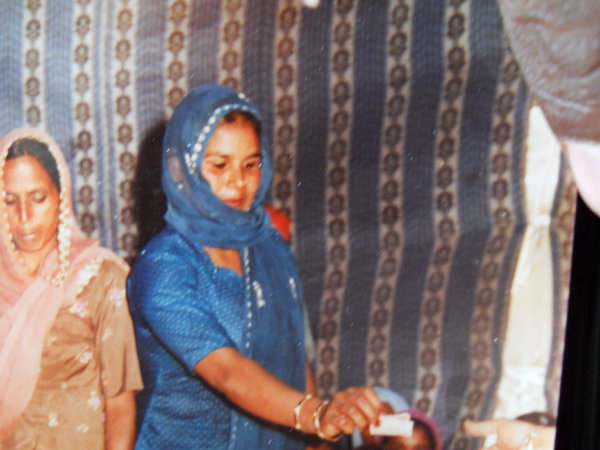Gurmeet Kaur
Extrajudicial execution between September 19, 1992 and October 5, 1992
Female, age 24-25
Demographics
Education
No education
Employment
Housewife
Married
Yes
Children
2
Religion
Sikh, Amritdhari
Caste
Jat

Abduction & Detention
Prior detentions
No
Perceived reason for targeting victim
Victim was related to a militant; Victim gave support to militants
Abduction preceding extrajudicial execution
Yes, September 19, 1992
Place of abduction
Witness(es) to abduction
Parents; Co-villager
Security officials informed witnesses about destination
Yes
Security officials uniformed
Yes
Detention Locations
Detention locations known
Police station/post, Bhikhiwind, for 10-15 days
Seen by sarpanch/politician
Witness report
Victim had been severely beaten.
Body Disposal
Body returned
No
Bhog notice
No
Security Forces Implicated
Forces involved in abduction
Officials involved in abduction
Paramjit Teja, Deputy Superintendent of Police, Punjab Police, Bhikhiwind
Forces involved in extrajudicial execution
Officials involved in extrajudicial execution
Paramjit Teja, Deputy Superintendent of Police, Punjab Police, Bhikhiwind
Militancy Involvement
Militant
No
Militant support provided
Yes, Voluntary
Remedies & Impact
Security officials approached
Yes, Punjab Police, from Bhikhiwind
Response by officials
Admitted custody only
Legal remedies pursued
No, Did not know what to do
Impact on family
Family member(s) dropped out of school
Remedies desired from government
Monetary compensation to family; Employment; Truth commission; Memorial for victims
Connected Victims
Genuine encounters in family
No
Co-victims of abduction
No
Co-victims of extrajudicial execution
Yes, 1
Family Reflections
Summary
Gurmeet Kaur was a Jat, Amritdhari Sikh, and a resident of village Kalia in Amritsar. She was 24 to 25 years old when security forces killed her. She had not received a formal education and worked as a housewife. Gurmeet Kaur was married and had two children. She was not involved in political activity; nor was she a militant. She voluntarily provided support to the militancy.
Security forces did not detain Gurmeet Kaur prior to the detention leading to her killing, although they visited her joint familial house three times and detained her brother-in-law once. Her brother-in-law Kabal Singh believes security forces targeted Gurmeet Kaur because her husband was a militant and she gave support to a militant.
Between September 19, 1992 and October 5, 1992, uniformed Punjab Police officials from Bhikhiwind illegally abducted Gurmeet Kaur from her home in village Kalia in Amritsar district. Kabal Singh explains, "At my brother's Bhog, police surrounded our home because my brother was a [member] of a militant group. Police picked up [Gurmeet Kaur] on the day of his Bhog." Deputy Superintendent of Police (DSP) Paramjit Teja of the Punjab Police from Bhikhiwind participated in the illegal abduction. Gurmeet Kaur's parents and a co-villager witnessed the abduction and security forces informed them that they were taking her to Bhikhiwind police station.
Punjab Police illegally detained Gurmeet Kaur at Bhikhiwind police station for 10 to 15 days between September 19, 1991 and October 5, 1992. A politician (sarpanch) witnessed Gurmeet Kaur's detention at Bhikhiwind police station. Kabal Singh explains, "She was... severely beaten." Punjab Police did not inform Kabal Singh about whether or not they presented Gurmeet Kaur before a judge or magistrate during this detention period.
Between September 19, 1992 and October 5, 1992, Punjab Police from Bhikhiwind killed Gurmeet Kaur in Amritsar district. They killed one other individual with her. DSP Paramjit Teja of the Punjab Police from Bhikhiwind participated in the killings. Gurmeet Kaur's family learned of her killing from a news article published between September 19, 1992 and October 5, 1992. The article alleged that she had been killed in a genuine encounter. Security officials did not return Gurmeet Kaur's body to her family, and Kabal Singh does not know how security forces disposed of the body.
Following Gurmeet Kaur's killing, the family approached the Punjab Police of Bhikhiwind, but security officials only admitted to Gurmeet Kaur's custody. The family did not file an FIR; nor did they approach a court or commission because they did not know what to do.
As a result of Gurmeet Kaur's killing, her children both dropped out of school. The family has been approached by other human rights organizations and does not fear persecution. They believe the government should establish a truth commission, grant monetary compensation, provide employment, and construct a memorial for victims.
Note: Subdistrict and district boundaries are based on the 2001 census. Read more about our methodology.


